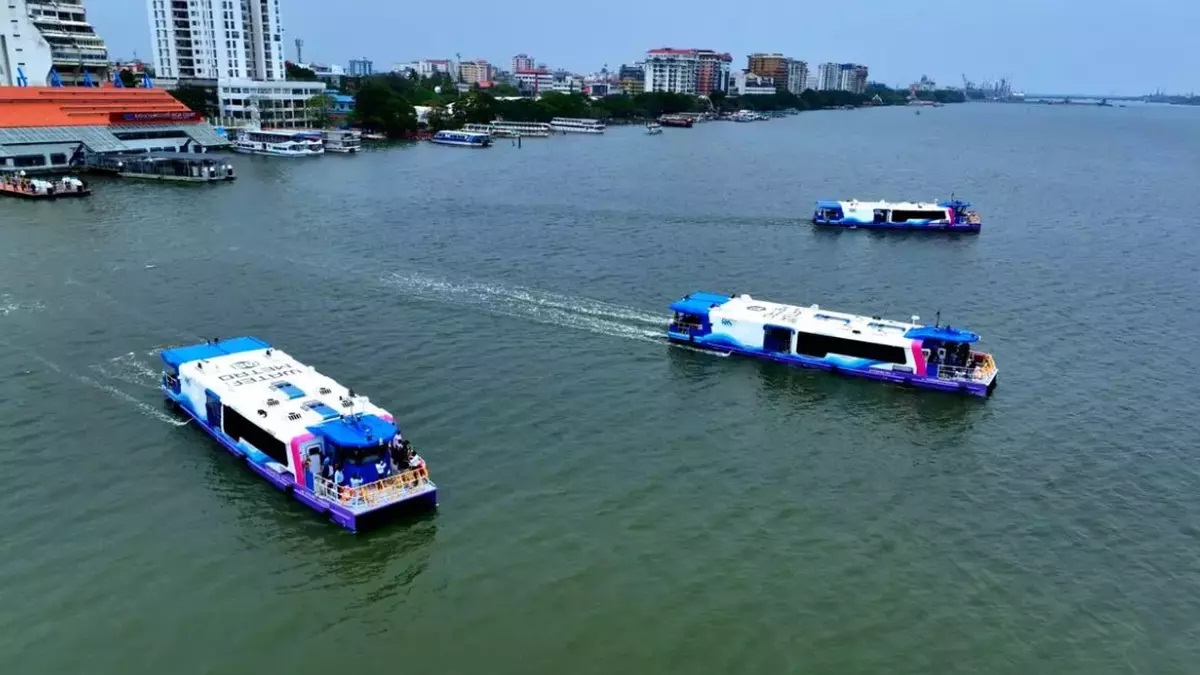Kochi Water Metro is India’s first water metro project. It is a state-of-the-art water transportation system that connects ten islands to the mainland in Kochi, Kerala. The project is a significant step towards promoting sustainable and environment-friendly modes of transportation in India.
Kochi, the commercial capital of Kerala, is the second-largest Indian city along India’s western coastline, after Mumbai. It is a bustling and vibrant city known for backwaters (a network of brackish lagoons and lakes lying parallel to the Malabar Coast), quaint beaches, and multicultural heritage. It is also home to India’s first Water Metro, a unique and innovative urban transportation system, inaugurated by Prime Minister Narendra Modi on April 25, 2023.
“Kochi’s geographical features, including backwaters and natural canals, make it an ideal location for water transport schemes. Our aim with the Water Metro system is to reintroduce water transport in a more organized manner”, says Dr. M. P. Ramnavas, Director (Projects), Kochi Metro Rail Ltd.
Connectivity Across Isles
The Kochi Water Metro Project is a state-of-the-art water transport system that connects ten islands to the mainland. It is a significant step towards promoting sustainable and environment-friendly modes of transportation in India.
The project is being implemented by Kochi Metro Rail Limited (KMRL), a joint venture between the Government of India and the Government of Kerala. The first phase of the project, which was inaugurated in April 2023, includes 78 boats and 38 terminals covering a route of 76 kilometres.
The Kochi Water Metro is a significant step towards achieving India’s Smart Cities Mission. It is also a positive example of how public-private partnerships can be used to develop innovative and sustainable infrastructure projects. A network of 78 electric ferries that operate on 15 routes, it links various parts of the city.
The project has a total value of 819 crore INR. The ferries are designed to be comfortable and accessible, with wheelchair ramps and elevators. There will be Navigational buoys and night navigational assistance throughout the routes. They also have spacious seating and large windows that offer panoramic views of the city. Kochi has over 1,100 km of waterways available. Only 40kms out of these are considered navigable for motorboats since, as per IWAI regulations.
The regulation says that the waterway must have a mandatory minimum depth of 2m for their operations. The Kochi Water Metro is a sustainable and inclusive solution for urban mobility. It is powered by electric batteries, which significantly reduces its environmental impact. It also operates primarily on renewable energy, with diesel being used only in emergency situations. It is also accessible to people with disabilities, the elderly, and children.
The Water Metro is also relatively affordable, with fares that are comparable to other forms of public transportation in Kochi. The project has been designed with great consideration for the environment. The boats produce minimal noise pollution and their low weight wash design creates minimal ripples in the water. As a result, the system has a minimal impact on the aquatic ecosystem and coastal areas.
The Water Metro project has been well-received by the public and has proven to be incredibly convenient for commuters travelling between the islands and the mainland. It has also helped to decongest roads and reduce traffic congestion. The success of the Kochi Water Metro Project has inspired other cities in India to explore the feasibility of implementing similar systems. Kollam Corporation in Kerala is emulating it.
The Kochi Water Metro Project is a shining example of how innovation and sustainability can be combined to create solutions that address urban transportation challenges. It is a model that can be replicated in other cities around the world, contributing to a more sustainable future.
Canal Rejuvenation Project
Kochi Metro Rail Limited (KMRL) had successfully developed the Canal Rejuvenation project with the Netherlands-based firm Andrea Nederland BV. The project had involved the completion of an advanced LiDAR survey to create a detailed topographic map, conduct a bathymetric survey, and map the sub-drains that connect to the canals.
Furthermore, extensive data collection has taken place to facilitate Social Impact Assessment and water quality studies. These canals once transformed into navigable waterways, will be integrated into the Kochi Water Metro project led by KMRL.
We have successfully undertaken the Water Metro Project, which has already been implemented. Now, we are actively engaged in a canal regeneration project for the Government of Kerala, covering three cities of Kochi, Trivandrum, and Kozhikode, adds Dr. Ramnavas.
It is believed the Kochi Water Metro will reduce carbon emission footprint (as boats will be electrically powered), traffic decongestion on the roads, and improved transport services. It will also improve livelihoods through commercial property development, tourism-based initiatives, and new job opportunities.
In the future, the project aims to introduce modern, energy-efficient, environment-friendly, and safe boats with low wake and draft characteristics at a high frequency to increase ridership. It will also take the cognition of water weed and floating waste management.
Ferries, Fare & Accessibility
The Kochi Water Metro will provide islanders with direct access to the mainland, making it easier for them to commute to work, school, and other essential services. This will help to improve their quality of life and economic opportunities. A total of 34,000 commuters using the ferries daily, in the project’s first phase.

It is estimated the ferries would lessen then 44,000 tonnes of carbon emission every year, by lessening the dependence on vehicles. The Kochi Water Metro makes it easier for tourists to visit the city’s many islands and attractions boosting tourism revenue and creating new jobs in the hospitality sector. Kerala’s prominence as a global tourist destination adds to making it easier.
Each ferry in the Water Metro operates every 15 minutes during peak hours and on-demand during other times, running from 7 a.m. to 8 p.m. Fares for the routes are set at a very nominal price. Fares can be as low as ₹10 per trip for those using the three-month ₹1500 pass.
Passengers have praised the ferries for their child and differently-abled-friendly features, with the added convenience of bicycle transportation. These ferries are designed to be accessible for differently-abled passengers, ensuring safe boarding regardless of high or low tide, with floating pontoons available at all terminals on the mainland and the ten islands.
Another noteworthy aspect of the Kochi Water Metro project is the involvement of women from the Kudumbasree self-help group in housekeeping, ticketing, and related tasks at terminals. With 555 personnel already engaged in similar roles at Kochi Metro stations since 2017, this initiative highlights empowerment and gender inclusion.





